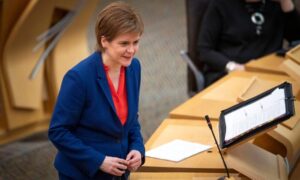Nicola Sturgeon has said it may be possible to accelerate Scotland’s exit from the coronavirus lockdown, as she confirmed that all school pupils would return to the classroom after the Easter break.
Scotland’s first minister told the Holyrood chamber the next phase of school reopening would begin from 15 March, when all children in primary 4 to 7 will go back full time as well as secondary pupils preparing for exams, while all secondary school pupils should be back in class after Easter.
She added that, while older pupils remained the priority, she expected all secondary pupils to receive some in-school education each week before the Easter break at the beginning of April.
Last week, Sturgeon said that the stay-at-home rule would remain in force until 5 April at the earliest and that she did not expect non-essential shops, or outdoor bars and restaurants, to reopen until late April, the date when the Scottish government expects to move to regional lockdown levels.
But on Tuesday afternoon Sturgeon said she hoped to be able to confirm changes to the framework for leaving lockdown next week, telling MSPs: “We will be considering if it might be possible to accelerate the exit from lockdown in any way.”
She said that recent data strongly suggested case numbers were declining to the lowest level since the first week of October last year, adding that the average test positivity rate had fallen below 5% and that hospital admissions were also falling.
Education Scotland will publish guidance for local authorities on the phased return of secondary schools in the coming week, and Sturgeon said that local authorities would have flexibility in how they implement the phased return.

Opposition leaders raised concerns about schools’ ability to welcome all pupils back while sticking to social distancing – which is required in secondary schools at least until Easter – as well as how teachers would manage both remote and in-person learning at the same time.
Ruth Davidson, the Scottish Conservative leader at Holyrood, said the announcement was “typically vague and only prolongs uncertainty”.
Sturgeon also said face coverings would need to be worn at all times when secondary schools returned, while ventilation remained important. She said many local authorities were using some of the £375m education recovery funding to monitor and improve ventilation in schools.
She emphasised that twice-weekly lateral flow testing would remain available for all school staff in primary, secondary and special schools, and all secondary school pupils in years 4, 5 and 6, adding: “It is a further important way in which we can ensure schools remain as safe as possible.”
we have a small favour to ask. Through these turbulent and challenging times, millions rely on the Guardian for independent journalism that stands for truth and integrity. Readers chose to support us financially more than 1.5 million times in 2020, joining existing supporters in 180 countries.
For 2021, we commit to another year of high-impact reporting that can counter misinformation and offer an authoritative, trustworthy source of news for everyone. With no shareholders or billionaire owner, we set our own agenda and provide truth-seeking journalism that’s free from commercial and political influence. When it’s never mattered more, we can investigate and challenge without fear or favour.
Unlike many others, we have maintained our choice: to keep Guardian journalism open for all readers, regardless of where they live or what they can afford to pay. We do this because we believe in information equality, where everyone deserves to read accurate news and thoughtful analysis. Greater numbers of people are staying well-informed on world events, and being inspired to take meaningful action.
In the last year alone, we offered readers a comprehensive, international perspective on critical events – from the Black Lives Matter protests, to the US presidential election, Brexit, and the ongoing pandemic. We enhanced our reputation for urgent, powerful reporting on the climate emergency, and made the decision to reject advertising from fossil fuel companies, divest from the oil and gas industries, and set a course to achieve net zero emissions by 2030.
If there were ever a time to join us, it is now. You can power Guardian journalism and help sustain our future.





